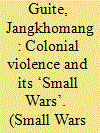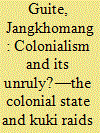| Srl | Item |
| 1 |
ID:
165199


|
|
|
|
|
| Summary/Abstract |
This paper concerns the lesser known British counterinsurgency (COIN) operations in Northeast frontier of India during the First World War. Officially known as the ‘Kuki Operations’, it was considered as part of the Great War. Carried out in isolation from press and public, and shelved in colonial archives, the event remained invisible until today. Yet, it registers a critical case of colonial COIN doctrine where the ‘moral effect’ doctrine was employed without being questioned. It unleashed enormous amount of organized violence, ranging from shoot at sight to indiscriminate burning of villages, wholesale destruction of property and livestock, prevention of cultivation and rebuilding of villages, forced mass displacement in jungles or in ‘concentration camps’, and collective punishment (communal penal labour and payment of compensation) after the war. This paper argues that the theory of ‘minimum force’ and the practicability of the ‘moral effect’ doctrine as applied by the Empire, sit oddly with each other at the frontier, where violence was seen both as a natural and moral orders. Violence as an ‘imperatively necessary’ method to bring order in a disorderly frontier, in the opinion of colonial state, informs and registers Northeast India as geography of violence.
|
|
|
|
|
|
|
|
|
|
|
|
|
|
|
|
| 2 |
ID:
141073


|
|
|
|
|
| Summary/Abstract |
This paper examines the colonial representation of tribal raids in the Northeast frontier of India and argues that, rather than being the ‘lawless and predatory habits of the savage hill tribes’, it was an expression of hill politics. The Kukis raided British territory when they discovered that an extension of the colonial boundary threatened their very existence as an independent state-evading population. It traces how the Kukis re-ethnicized themselves in the hills by evolving a system that is state-repellent, protected by a vast strip of forested jungle around their settlements commonly known as the ‘hunting ground’. It locates the ‘raid’ in the context of the difference in the perception of space and territoriality between the colonial state and indigenous polities. Colonial spatial ideology and its hill-valley binary are seen to play a vital role in animating tension on the frontier. The raid is thus understood as the ultimate weapon of resistance against an established state by an independent ‘not-a-state-subject’ people in defence of their autonomy and essentially represents non-state practices against state appropriations. Instead of being ‘unruly’, the raid is seen as a form of organized and premeditated resistance based on the consciousness of the hillmen's lived world order.
|
|
|
|
|
|
|
|
|
|
|
|
|
|
|
|